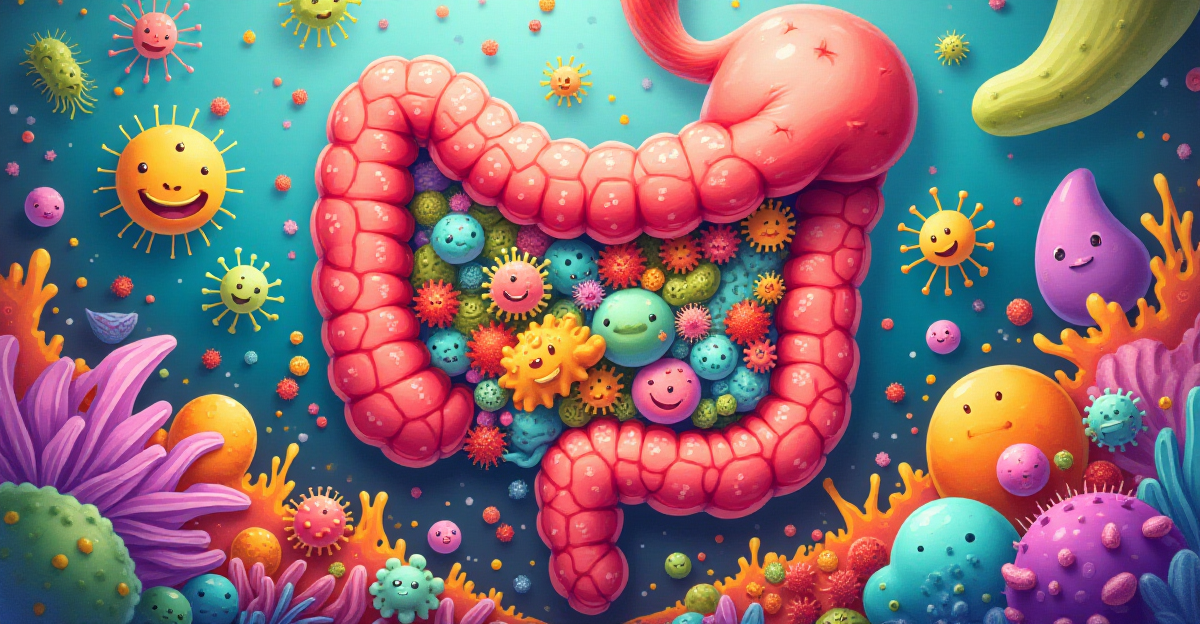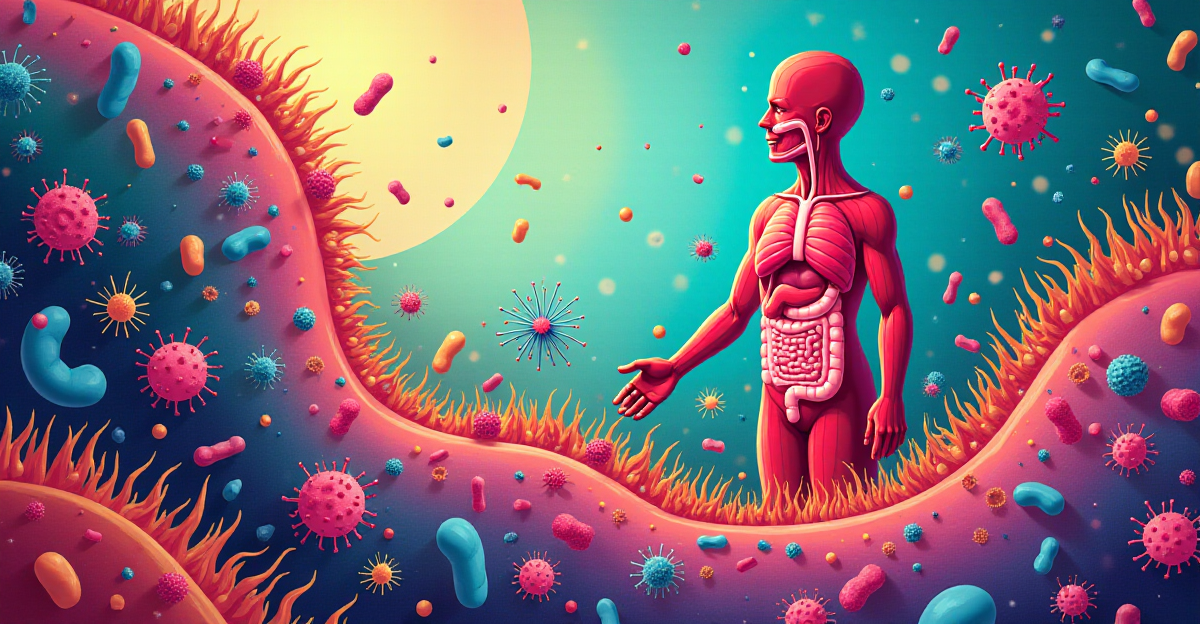Affecting digestion, immune system, even mental well-being, the human microbiome is absolutely vital for our health. This page looks at the functions of the gut microbiome and provides advice on preserving a healthy one.
Table of Contents
What Is the Microbiome?

Ever wonder whether you really are alone in your body? You might be shocked to find you are not. Trillions of microscopic creatures, including viruses, fungus, and bacteria, together referred to as your microbiome, share your area. This varied community is more than simply a group of small renters; it’s a critical component of your whole health that affects everything including immunity and digestion as well as your mood and mental state.
Understanding Your Gut Microbiome
Referred to as your gut microbiome, your gut has the biggest and most varied population of bacteria in your body. Your food is broken down, nutrients are absorbed, and vitamins your body need are produced in great part by this sophisticated community. Still, its significance beyond gut health. A good gut flora protects you from dangerous germs, boosts your immune system, and even affects your brain activity and mood.
How Your Gut Microbiome Impacts Your Well-being
Let’s investigate how your gut microbiome affects your state of health:
- Digestion and Nutrient Absorption: The gut bacteria help break down complex carbohydrates and fiber that your body can’t digest on its own. They also produce short-chain fatty acids, which provide energy to your cells and play a role in regulating inflammation.
- Immune System Support: Your gut microbiome helps train your immune system to recognize and fight off harmful pathogens. It also helps regulate inflammation and prevents autoimmune diseases.
- Mental Health: Emerging research suggests a strong connection between your gut microbiome and mental health. The gut bacteria produce neurotransmitters that influence your mood, stress levels, and cognitive function.
Cultivating a Thriving Gut Microbiome
By choosing your diet and everyday activities with awareness, you can create a strong gut microbiome supporting your general health.
- Probiotics for a Balanced Gut: Probiotics are beneficial bacteria that naturally occur in fermented foods like yogurt, sauerkraut, kimchi, and kombucha. They help rebalance your gut microbiome and promote gut health. Incorporating fermented foods into your diet can help improve your digestion and reduce bloating.
- Prebiotics Fuel for Your Gut Bacteria: Prebiotics are types of fiber that your body can’t digest, but your gut bacteria can. They act as fuel for your beneficial gut bacteria, helping them thrive. You can find prebiotics in foods like onions, garlic, asparagus, and bananas.
- Diet Matters: A balanced diet rich in fruits, vegetables, whole grains, and lean protein provides the necessary fuel for a healthy gut microbiome. On the other hand, processed foods and sugary drinks can disrupt the balance of your gut, leading to digestive problems and other health issues.
- Stress Management: Stress can negatively impact your gut health. Engage in stress-reducing activities like exercise, yoga, and meditation to maintain gut health.
- Sleep and Hydration: Getting enough sleep, 7-9 hours per night, and staying hydrated are also essential for a thriving gut microbiome.
You can begin to cultivate a happy and healthy stomach by small lifestyle adjustments. In addition to enhancing your immune system, a healthy stomach can raise your mood and even help with skin health. The number of facets of your life that a healthy gut can affect may astound you!
How Gut Health Affects the Body

Have ever felt something like a gut feeling that proved accurate? It’s not only a proverb! Your gut health affects everything from digestive health and your immune system to your mood and mental clarity, therefore determining your general well-being. It’s all down to your microbiome—that is, the billions of microbes dwelling in your gut.
See your gut as a busy metropolis bursting with life. Your microbiome—this intricate ecosystem of viruses, fungus, and bacteria—helps you stay healthy in great part. These bacteria aid in food breakdown, nutrient absorption, vitamin synthesis, and even immune system training to combat dangerous bacteria.
Understanding Your Microbiome
The state of your gut bacteria directly affects your general well-being. Essential for best digestion and nutritional absorption, these helpful bacteria are sometimes known as probiotics. Their breakdown of difficult carbs and fibers helps your body to more readily use these nutrients. Short-chain fatty acids they also generate give your cells energy and assist control body inflammation.
The Impact of a Healthy Gut
A healthy and strong microbiome will help in several spheres of your life. A good gut, for instance, supports a strong immune system, which helps control inflammation and maybe prevent autoimmune illnesses and other chronic conditions.
New studies point to a close relationship between your mental health and gut flora. These probiotics generate neurotransmitters that affect cognitive ability, stress, and mood as well as stress. Studies point to gut microbiome abnormalities perhaps related to disorders including anxiety and depression.
You might be wondering how to maintain a healthy gut and keep your microbiota strong. It’s easier than you’d believe! To guarantee your gut is running at its best, you can choose deliberately about your nutrition, way of life, and stress management.
Cultivating a Healthy Gut
These pointers help to support a good microbiome:
- Good Bacteria for a Balanced Gut: Incorporate probiotics into your diet through fermented foods like yogurt, sauerkraut, kimchi, and kombucha. You can also consider taking probiotic supplements.
- Fiber Fuels Your Gut Bacteria: Fiber acts as fuel for your beneficial gut bacteria, promoting a healthy gut environment. You can find fiber in foods like onions, garlic, asparagus, and bananas.
- Diet Matters: Eat a balanced diet rich in fruits, vegetables, whole grains, and lean protein to fuel your healthy microbiome. Processed foods and sugary drinks can disrupt the balance of your gut, leading to digestive health problems and other health issues.
- Stress Management: Stress can negatively impact your gut health. When you’re stressed, your body produces hormones that can alter the composition of your gut bacteria and increase inflammation in the body. Engage in stress-reducing activities like exercise, yoga, and meditation to maintain gut health. I’ve personally found that meditation helps me manage anxiety, which has a direct impact on my gut health. For example, I used to experience frequent stomach discomfort and bloating when I was particularly stressed. Since incorporating meditation into my daily routine, I’ve noticed a significant improvement in my digestive health.
- Sleep and Hydration: Getting enough sleep, 7-9 hours per night, and staying hydrated are essential for a thriving microbiome.
Choosing your nutrition, way of life, and stress management strategy deliberately will help you develop a happy and healthy gut. Overall wellness depends on a healthy gut! From enhanced digestive health and a stronger immune system to better mood and skin condition, you will feel the difference. This week try including some fermented foods into your diet. How much better you feel will astound you.
Ways to Improve Your Gut Microbiome

Have you ever given the millions of microscopic creatures residing in your “digestive health any thought? Your “gut microbiome,” this amazing universe, is absolutely vital for your general health. From “digestive health” and immune function to cerebral clarity and even your mood, these tiny occupants affect everything. Feeling your best depends on a healthy intestinal environment, which you can actively create with deliberate decisions made everyday.
Strategies for a Thriving Gut Microbiome
Maintaining balance among the healthy bacteria in your “gut flora” requires maintenance. This entails choosing wisely what to eat, controlling stress, giving sleep and hydration top priority.
Prioritize a Balanced Diet
The basis of a good stomach is a well balanced diet. Start by including in your meals lots of fruits, veggies, and whole grains. Rich in “prebiotics,” a kind of fiber that fuels the good bacteria in your stomach and therefore stimulates their growth and activity, these meals Consider “prebiotics” as the fertilizer feeding your “gut bacteria.” Foods heavy in prebiotics include onions, garlic, asparagus, bananas, and whole grains. Fermented foods include yogurt, sauerkraut, kimchi, and kombucha also contain “probiotics,” living bacteria that directly help to balance the “gut microbiome.” Aim to have a serving or two of fermented foods in your diet every week.
Recall that although “prebiotics and probiotics” have great value, they are only two bits of the puzzle. Try to have a balanced diet generally, cutting processed foods and sugary beverages to help to preserve the delicate equilibrium of your gut flora.
For instance, I used to battle stomach trouble and bloating following meals. But my “digestive health” improved noticeably once I started included more fermented foods and “prebiotics” into my diet. I began eating more kimchi, yogurt, and asparagus and made sure to have a range of fruits and vegetables in my meals. It’s incredible how much of a difference basic dietary changes can produce!
Manage Stress Effectively
Has your stomach trouble ever started while you’re stressed? Stress might upset your stomach. Stress causes hormones your body releases that might change the makeup of your gut flora and aggravate inflammation. For a good gut, then, stress management is absolutely vital.
Participate in stress-lowering pursuits including yoga, meditation, exercise, and outdoor time. Discover what fits you best and schedule regular visits based on it.
For instance, Sarah, a friend of mine, used to have regular stomach pains and bloating and blamed stress. She started yoga and found her “digestive health” improved as well as her stress was better managed. After including daily yoga into her weekly schedule, Sarah began to feel less uncomfortable and bloat dropped. She even told me she feels more grounded and in balance generally.
Prioritize Sleep and Hydration
Though sometimes disregarded, getting adequate sleep and drinking enough water are crucial for preserving a good gut flora. Sleep deprivation and dehydration can throw off your gut’s balance and compromise your immune system.
Try for 7 to 9 hours of nightly quality sleep. And be sure you’re getting enough water all through the day. Although eight glasses of water a day is the usual advice, your activity level and climate could call for more.
These techniques can help you to cultivate a strong gut microbiota and enjoy the advantages of a better, happier you. Recall that general well-being depends much on a healthy gut! Are you therefore ready to improve your “digestive health”? Start by including these basic techniques into your everyday schedule and notice how different they make!
Extra’s:
For those seeking a deeper understanding of the intricate connections within our universe, exploring the realm of “Heliophysics: Understanding the Sun and Its Effects on Space” might be of interest. This post delves into the fascinating interplay between our Sun and its impact on the vast expanse of space, offering insights into the forces that shape our cosmic environment. Alternatively, if you’re intrigued by the challenges and solutions surrounding our energy future, “Beyond Fossil Fuels: Innovative Alternatives Shaping Our Future” explores the groundbreaking advancements in renewable energy technologies and their potential to usher in a sustainable future.
To delve further into the intricate relationship between the gut microbiome and stress management, you can explore the insightful article “Gut microbiome is linked to how we handle stress in new study : Shots – Health News : NPR.” This piece sheds light on the remarkable connection between gut health and our ability to cope with stress, highlighting the crucial role of the microbiome in maintaining overall well-being. For a comprehensive overview of the gut microbiome’s impact on health and diseases, “Update on the gut microbiome in health and diseases – PMC” provides an in-depth analysis of the latest research and findings in this rapidly evolving field.












1 thought on “The Power of Your Microbiome: How Gut Health Impacts Overall Well-Being”